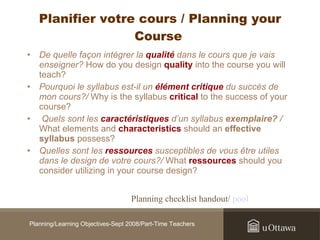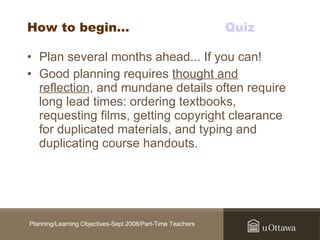Student Centered
- 1. Plan de cours et objectifs d’apprentissage / Syllabus & Learning Objectives Andrée Robertson Centre de pédagogie universitaire (CPU) / Centre for University Teaching 613-562-5800, 2784 [email_address]
- 2. À la fin de cet atelier, les personnes participantes seront en mesure de: Comprendre l’importance de l’organisation d’un cours Distinguer les orientations/modèle d’un plan de cours Expliquer ce qu’est un objectif d’apprentissage/résultat d’apprentissage Distinguer les niveaux d’apprentissage (domaine cognitif) Rédiger un ou deux résultats d’apprentissage en lien avec leur discipline
- 4. Planifier votre cours / Planning your Course De quelle façon intégrer la qualité dans le cours que je vais enseigner? How do you design quality into the course you will teach? Pourquoi le syllabus est-il un élément critique du succès de mon cours?/ Why is the syllabus critical to the success of your course? Quels sont les caractéristiques d’un syllabus exemplaire? / What elements and characteristics should an effective syllabus possess? Quelles sont les ressources susceptibles de vous être utiles dans le design de votre cours?/ What ressources should you consider utilizing in your course design? Planning checklist handout/ pool
- 5. Content-centered planning model Student-centered planning model SYLLABUS... or
- 6. Content-centered planning model What would be the operating planning questions?
- 7. How much of this content can I cover? How much time do I have to cover it? Should I emphasize breadth or depth of coverage? What materials will I need to teach the course?
- 8. Common disadvantages No guidelines for selecting the content to be covered Impossible to include all the material that is relevant to a given course Focus on content can also lead to an emphasis on learning factual information rather than mastering higher-level thinking skills. Research has shown that retention of factual content beyond the final exam is minimal; most of it is lost within a few weeks Most common complaint : teachers try to cover too much material
- 9. Student-centered planning model What would be the operating planning questions?
- 10. In what ways will students be better thinkers when they finish the course? What should students be able to do with the knowledge and skills gained in the course ? What portions of the content are germane to these learning goals ? What kinds of tasks should students perform in order to achieve these goals ?
- 11. The Learning-Centered Syllabus "A learning-centered syllabus requires that you shift from what you, the instructor, are going to cover in your course to a concern for what information and tools you can provide for your students to promote learning and intellectual development" (Diamond, p. xi).
- 12. This model.... Focuses on content mastery as much as the intellectual skills that students should have when they finish the course Shifts the responsibility for learning back on the student because planning decisions are made on the basis of activities that students must perform Makes selection of material easier, since course goals dictate the content that will be included Moreover, students tend to remember factual details longer if the facts are associated with higher-order thinking processes such as problem-solving, analysis, and critical thinking
- 13. This model can be applied to the design of any kind of instruction, from single lectures to entire curricula, and many teachers have reported that they have used it to improve their presentations at professional conferences.
- 14. How to begin... Quiz Plan several months ahead... If you can! Good planning requires thought and reflection , and mundane details often require long lead times: ordering textbooks, requesting films, getting copyright clearance for duplicated materials, and typing and duplicating course handouts.
- 15. Remember... No teacher--even the best--will create a great course on the first try. As a matter of fact, some instructors feel that you must teach a course at least three times before it really works well.
- 16. Some readings... Tips on Teaching Revising a course Book : Lyons...
- 17. Basic Planning Model Syllabus Pool Handout
- 18. Constructing a Syllabus Example - video
- 19. Some Thinking..... Can you ever give too much information in a syllabus? If the syllabus is a contract, who enforces it? Should issues like classroom behavior, civility be addressed in the syllabus? How? Will setting a course schedule "limit" my ability to be flexible with the course materials? How can I deliver a syllabus to students other than through the standard black and white written format? Does a student's 24-7 access to internet mean 24-7 access to me? What information do students value on a syllabus?
- 20. Syllabus template (handout) Textbook evaluation (handout)
- 22. Lecture – Poll Is a lecture appropriate for this class? How much lecturing is appropriate? If the lectures have already been written for you (happens sometimes as an adjunct); what can you do with those lectures to still make them reflect your personality and identified teaching philosophy? Will you have access to the technology you need or are used to in order to present your lecture? What "free" and/or supported technology is available to you? Is there anything new I can learn about lecturing if I've done it for years and years? A few words... Quiz on Lectures
- 23. Learning Objectives... Or... Learning Outcomes
- 24. À quoi fait-on référence lorsqu’on parle d’objectifs d’apprentissage??? D’habilités, de connaissances à développer…? De résultats attendus???
- 25. Que souhaitez-vous que les étudiants apprennent/ réalisent à la fin de cette leçon/de ce chapitre/du cours ? What do you want your students learn at the end of the class/chapter/semester/…
- 26. Definitions... Un objectif d’apprentissage est un énoncé qui indique ce que l’apprenant pourra faire à la suite d’un enseignement (Prégent, 1991; Vaneeta-Marie, D’Andrea, 1999) Un résultat d’apprentissage est une phrase qui précise ce que les étudiants devraient savoir, démontrer ou produire à la suite de leur apprentissage (Anderson et al., 2001).
- 27. What is a GOOD learning outcome...? ... ... ...
- 28. Learning outcome must be measureable Action Verbs Learning outcome must include conditions under which they will occur At the end of the module After an exercise or demonstration By the next class (homework) Learning outcome must include criteria by which it will be measured % of competency (list, describe, differentiate between) After an exercise (demonstrate skill) By the next class (successful completion of homework) Anatomy of a Learning Outcome
- 29. Taxonomie révisée de Bloom - Revised Bloom Taxonomy- (Anderson et al., 2001) Cognitive Domain – domaine cognitif Upper Level of Thinking Lower Level of Thinking handout
- 30. Niveaux d’apprentissage (Bloom, 1956) Passif Méthodes d’apprentissage actif Connaître définir répéter enregistrer raconter souligner Comprendre traduire décrire reconnaître expliquer exprimer identifier trouver Appliquer interpréter appliquer employer adapter pratiquer illustrer utiliser prévoir ébaucher Analyser distinguer analyser évaluer calculer comparer opposer inspecter discuter questionner classer Synthétiser composer planifier proposer concevoir formuler arranger assembler recueillir créer organiser gérer préparer Juger estimer évaluer classifier comparer réviser
- 31. Anatomy of a Learning Objective Criteria … the four major reasons… (100% competency) Performance (action verb) … the participant will be able to identify…why it is important to develop a plan for their research project… Conditions At the end of this module…
- 32. Or... Utilisez la formule : Cadre temporel : « Après avoir terminé les travaux dirigés en ligne… » Accent sur l’étudiant : « … les étudiants seront en mesure de… » Verbe d’action : « … faire la différence entre… » Produit/processus : « … périodiques scientifiques et revues populaires »
- 33. Example... By the end of this course, you should be able to do the following: Recognize and define the basic concepts of society and the ways in which sociologists use these concepts in constructing explanations for individual and group problems. Explain how Canadian institutions are maintained or changed by individuals or groups in society. Analyze a selected number of Canadian institutions using the basic concepts and theories of the sociological perspective. Analyze selected past, present, and future problems of Canadian institutions using the knowledge you have gained in 1, 2, and 3, above.
- 34. If you state your course goals in terms of student performance , you will have a much better foundation on which to build the course. You can then work backward from these goals to select material that is most appropriate for achieving them .
- 35. Appropriation Pensez à un cours que vous avez donné ou prévoyez donner. Dressez une liste des concepts abordés dans cet exposé. Écrivez deux résultats d’apprentissage relevant chacun d’un niveau différent de la taxonomie de Bloom. Comparez avec celui rédigé au début de la session. Quelles sont les différences les plus marquantes?
- 36. Planning for instruction Divide the course into manageable pieces Choose activities for each class Provide for quizzes and exams, and integrating these elements into a coherent whole For example, a short lecture might be followed by an in-class writing assignment, a guided discussion on the reading, followed by a short summarization lecture at the end of class Handout - Lesson
- 37. Appropriation Que retenez-vous de cette session? De quelle façon comptez-vous intégrer – à votre pratique régulière - ces nouvelles connaissances?
- 39. Andrée Robertson, Ph.D. Centre for University Teaching [email_address] 613-562-5800, 2784
![Plan de cours et objectifs d’apprentissage / Syllabus & Learning Objectives Andrée Robertson Centre de pédagogie universitaire (CPU) / Centre for University Teaching 613-562-5800, 2784 [email_address]](https://image.slidesharecdn.com/studentcentered13sept08-1222193655994874-9/85/Student-Centered-1-320.jpg)





































![Andrée Robertson, Ph.D. Centre for University Teaching [email_address] 613-562-5800, 2784](https://image.slidesharecdn.com/studentcentered13sept08-1222193655994874-9/85/Student-Centered-39-320.jpg)